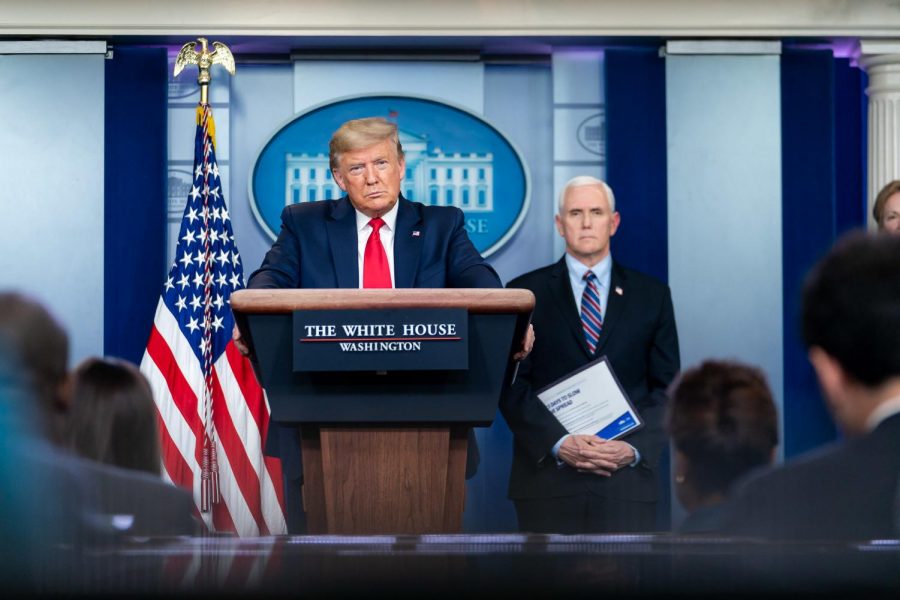President Trump announces using Hydroxychloroquine
President Donald J. Trump, joined by Vice President Mike Pence and members of the White House Coronavirus Task Force, listens to a reporter’s question at the coronavirus (COVID-19
May 19, 2020
Despite medical experts warnings of the negative side effects of hydroxychloroquine, President Trump said on Monday he is using the drug as a preventive measure and is continuing to test negative for COVID-19.
“All I can tell you is so far I seem to be OK,” Mr. Trump said, adding that he had been taking the drug for about a week and a half, with the approval from the White House physician. “I get a lot of tremendously positive news on the hydroxy,” Trump continued, explaining that his decision to try the drug was based on one of his favorite refrains: “What do you have to lose?”, according to a New York Times article published on Monday.
The Food and Drug Administration issued a safety warning in April because the drugs, hydroxychloroquine and chloroquine, used for malaria, can cause dangerous abnormalities in heart rhythm in COVID-19 patients after results from a small study from the Journal Nature Medicine reported abnormal heart rhythms in 84 patients treated with the drugs.
Out of the 84 patients, four died from multi-organ failure without evidence of arrhythmia, 64 patients remained admitted and 16 were discharged.
It was a five-day trial.
In Brazil, another study that involved 81 hospitalized patients, taking the same drugs, was halted because 11 patients had died leading to an immediate end to the high-dose segment of the trial according to a New York Times article published on April 12.
“To me, this study conveys one useful piece of information, which is that chloroquine causes a dose-dependent increase in an abnormality in the ECG that could predispose people to sudden cardiac death,” said Dr. David Juurlink, an internist and the head of the division of clinical pharmacology at the University of Toronto, referring to an electrocardiogram, which reads the heart’s electrical activity.
According to the Times article, the Health Commission of Guangdong Province in China had initially recommended those sick with COVID-19 be treated with 500 milligrams of chloroquine twice daily for 10 days.
One of the authors of the Brazilian study, Dr. Marcus Lacerda, said in an email that this study found that “the high dosage that the Chinese were using is very toxic and kills more patients.”
“That is the reason this arm of the study was halted early,” Lacerda said, adding that the manuscript was being reviewed by the journal Lancet Global Health.
The article went on to say that several clinical trials for chloroquine and hydroxychloroquine are testing low doses for shorter periods of time in COVID-19 patients.
Some medical experts are criticizing Trump in his promotion of the drugs and calling him irresponsible.
Dr. Scott Solomon, a professor of medicine at Harvard Medical School, said Mr. Trump’s decision to try the drug was up to him and his physician. “But what is irresponsible is the example he is setting,” Dr. Solomon said.
“My concern would be that the public not hear comments about the use of hydroxychloroquine and believe that taking this drug to prevent Covid-19 infection is without hazards. In fact, there are serious hazards,” said Dr. Steven E. Nissen, the chief academic officer of the Miller Family Heart, Vascular & Thoracic Institute at the Cleveland Clinic.
Dr. Manny Alvarez, the senior managing editor for Fox News’ health news, said on air that the president’s statement was “highly irresponsible” and asked what had changed since studies showed the drug had no benefits.
Even Dr. Rick Bright, who led the federal agency involved in developing a vaccine said he was removed from his post after he pressed for rigorous vetting of the drug and he was pressured to direct money toward hydroxychloroquine, one of several “potentially dangerous drugs promoted by those with political connections.”
The White House physician, Dr. Sean P. Conley, released a statement in reference to President Trump announcing he is taking the drug.
“After numerous discussions he and I had regarding the evidence for and against the use of hydroxychloroquine, we concluded the potential benefit from treatment outweighed the relative risks,” Dr. Conley said. He also said the president “is in very good health and has remained symptom free.”
According to the NYT article published on Monday, early studies of hydroxychloroquine in the laboratory suggesting that the drug could block the coronavirus from attacking cells prompted initial enthusiasm, but the studies of the drug in humans so far have pointed to serious side effects.
“I think it’s a very bad idea to be taking hydroxychloroquine as a preventive medication,” said Dr. Eric Topol, a cardiologist and the director of the Scripps Research Translational Institute in La Jolla, Calif. “There are no data to support that, there’s no evidence and in fact there is no compelling evidence to support its use at all at this point.”
Topol also warns that fatal arrhythmia could come without warning and it could happen in people who are healthy.


